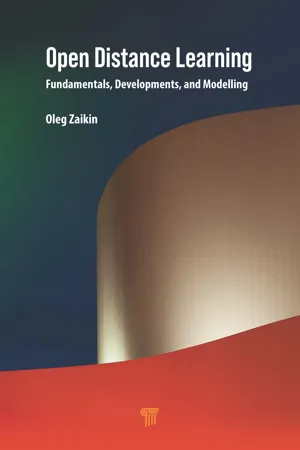
- 412 pages
- English
- ePUB (mobile friendly)
- Available on iOS & Android
About this book
Motivational and social aspects as interactions among teachers and students are essential for a successful educational process in an open distance learning (ODL) environment, and the goal of this book is to develop an interactive model to manage motivation between the participants of the learning process. The book deals with the important and topical problem of e-learning, closely connected with the use of modern information technologies in education. The focus is on developing an information management system for supporting the distance learning process in colleges and universities in the context of steadily expanding information technologies. On the basis of exiting standards (SCORM, etc.) as well as information systems and platforms (e.g., Moodle, etc.), the author proposes a coherent and original concept of modelling three ODL subprocesses: (1) an ontological model (how to represent the structure of didactic materials), (2) a motivation and collaboration model (how to motivate project process participants) and (3) a simulation model (how to realise the learning/project process). The proposed models constitute a theoretical formalization of a new situation in which a teacher and students are obligated to elaborate on didactic material repository content in accordance with the requirements of acquired competencies. A mathematical method based on game theory and simulation is suggested. The kind of educational system represented in the book can be used as a model of open distance learning aimed at active behaviour of students and teachers in not only the development of knowledge but also the acquiring of competencies.
Tools to learn more effectively

Saving Books

Keyword Search

Annotating Text

Listen to it instead
Information
Table of contents
- Cover Page
- Half Title page
- Title Page
- Copyright Page
- Contents
- Preface
- Foreword
- Acknowledgements
- 1 Open Distance Learning
- 2 Methods of Modelling of Competence
- 3 Team Project Process Oriented on Acquiring Competence
- 4 Ontology Modelling in Open Distance Learning
- 5 Motivation Modelling in Open Distance Learning
- 6 Collaboration Modelling in Open Distance Learning
- 7 Incentive Model of a Project Learning Process
- 8 Simulation Experiments as a Ground for Acquiring Competencies in the ODL Environment
- 9 Conclusions
- Glossary
- References
- Index
Frequently asked questions
- Essential is ideal for learners and professionals who enjoy exploring a wide range of subjects. Access the Essential Library with 800,000+ trusted titles and best-sellers across business, personal growth, and the humanities. Includes unlimited reading time and Standard Read Aloud voice.
- Complete: Perfect for advanced learners and researchers needing full, unrestricted access. Unlock 1.4M+ books across hundreds of subjects, including academic and specialized titles. The Complete Plan also includes advanced features like Premium Read Aloud and Research Assistant.
Please note we cannot support devices running on iOS 13 and Android 7 or earlier. Learn more about using the app